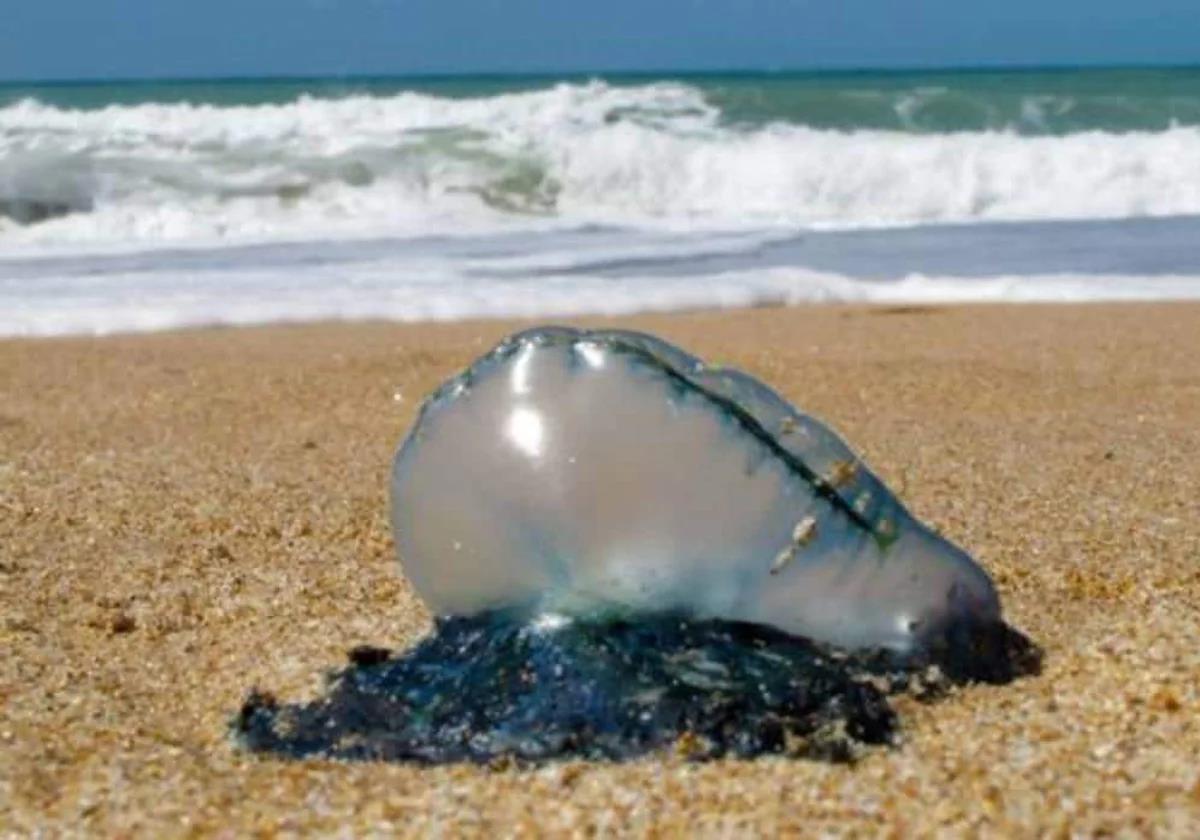

Sections
Highlight

Pepe Ortega
Chiclana
Wednesday, 3 July 2024, 19:04
The municipal beach cleaning service in Chiclana (Cadiz province) in the Andalucía region of Spain, with the collaboration from the Red Cross, collected " six Portuguese man o' war washed up on the shore of the popularLa Barrosa beach on Sunday. One person was taken to La Longuera emergency treatment centre under observation after being stung by one of them, according to Red Cross sources. The following day, Monday, the removal of four more of these organisms was carried out without further incidents being reported.
The appearance of this species on La Barrosa beach "is more common between the months of April and May". According to the Red Cross: "The Portuguese man o' war is moved around by the currents. In recent days we have had onshore winds blowing, which has brought them closer to the shore, but as soon as the wind changes we will no longer see them." The Red Cross went on to assure that, for this reason (a change in wind direction), not one was found on Tuesday.
Despite the presence of these few bluebottles (the other name for these organisms closely related to jellyfish), no swarms were detected that would have led to a ban on bathing, nor was there an increase in the number of visits to healthcare services. "The protocol is activated depending on the number of cases, and we have only had one occurrence, and if swarms are detected, which is also not the case here. It was a one-off incident." As a result of these appearances on the shore, the Red Cross exercised extreme vigilance and collaborated with the beach cleaning service to remove them before "a child or someone touched them by mistake". "In the case of the Portuguese man o' war, this occurrence only required increased vigilance along the shore and at sea. The parameters did not indicate the need to apply any other measure."
Their characteristic purple and blue colours always attract the attention of bathers and beachgoers. "When they come ashore, it's only a matter of time before they die. The ones that have appeared are small, they are not very big." The incidents that usually happen on La Barrosa beach are more likely to be stings from spider fish [also known as greater weever fish], wasps or the common jellyfish and people with allergic reactions to such stings. "This is not a beach that has many problems with the Portuguese man o'war. However, when we have the common jellyfish, we have a lot more work to do. The little ones start playing along the shore and then the mothers come to you with rashes and they don't know what it's from," explained a Red Cross source.
The symptoms of a sting vary depending on the affected area and the person. "They are practically the same symptoms as from the transparent jellyfish or the common jellyfish, but the toxin is much more potent in thebluebottle. It depends a lot on the area where it stings you and it depends a lot on each person," explained the Red Cross source. The most common symptoms are irritation of the affected area, sweating, generally feeling very weak or suffering muscle spasms, among others. One of the problems is that children play with their very long tentacles and end up being poisoned by them.
If you are stung by a Portuguese man o' war or the common jellyfish, it is important not to remove the tentacles, which can be metres long, if you have them on your body. Never clean the affected area with fresh water, but always with salt water. Furthermore, in order not to transfer the toxin to your hands, it is important not to remove the remains with your bare hands and, if the reaction has been serious, seek medical attention as soon as possible.
Publicidad
Publicidad
Publicidad
Publicidad
Esta funcionalidad es exclusiva para registrados.
Reporta un error en esta noticia

Debido a un error no hemos podido dar de alta tu suscripción.
Por favor, ponte en contacto con Atención al Cliente.

¡Bienvenido a SURINENGLISH!

Tu suscripción con Google se ha realizado correctamente, pero ya tenías otra suscripción activa en SURINENGLISH.
Déjanos tus datos y nos pondremos en contacto contigo para analizar tu caso

¡Tu suscripción con Google se ha realizado correctamente!
La compra se ha asociado al siguiente email
Comentar es una ventaja exclusiva para registrados
¿Ya eres registrado?
Inicia sesiónNecesitas ser suscriptor para poder votar.